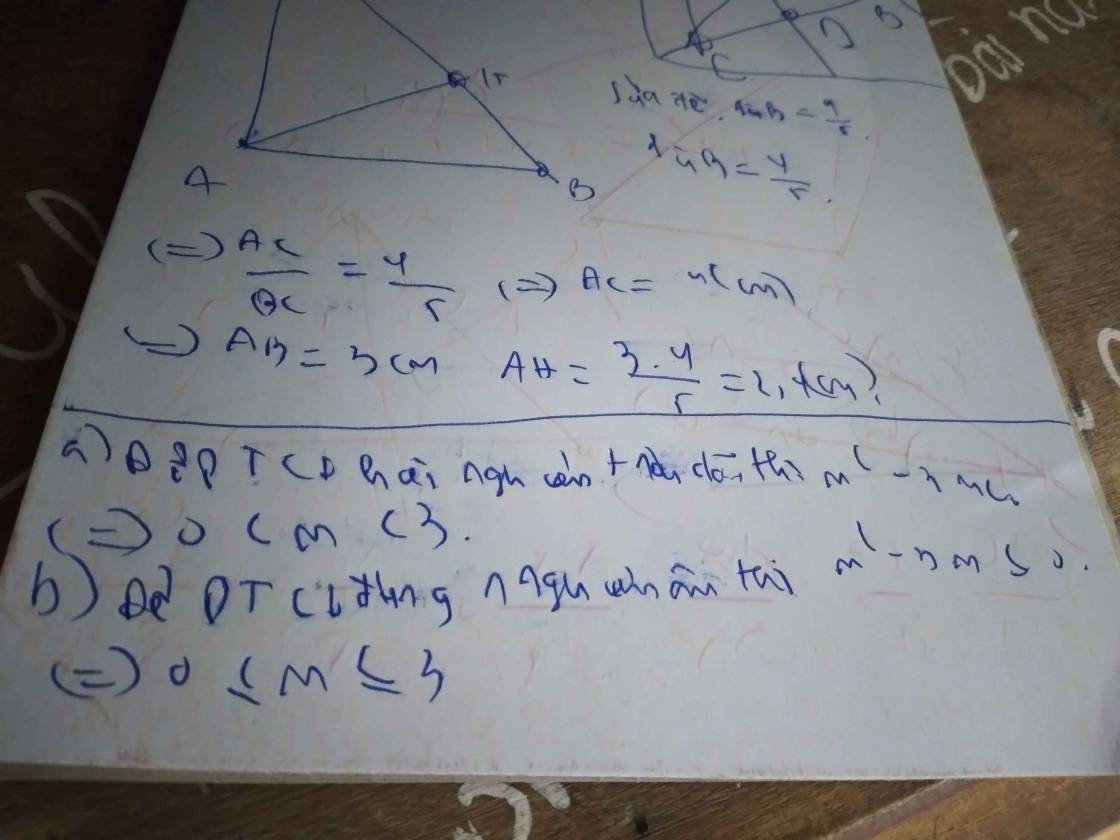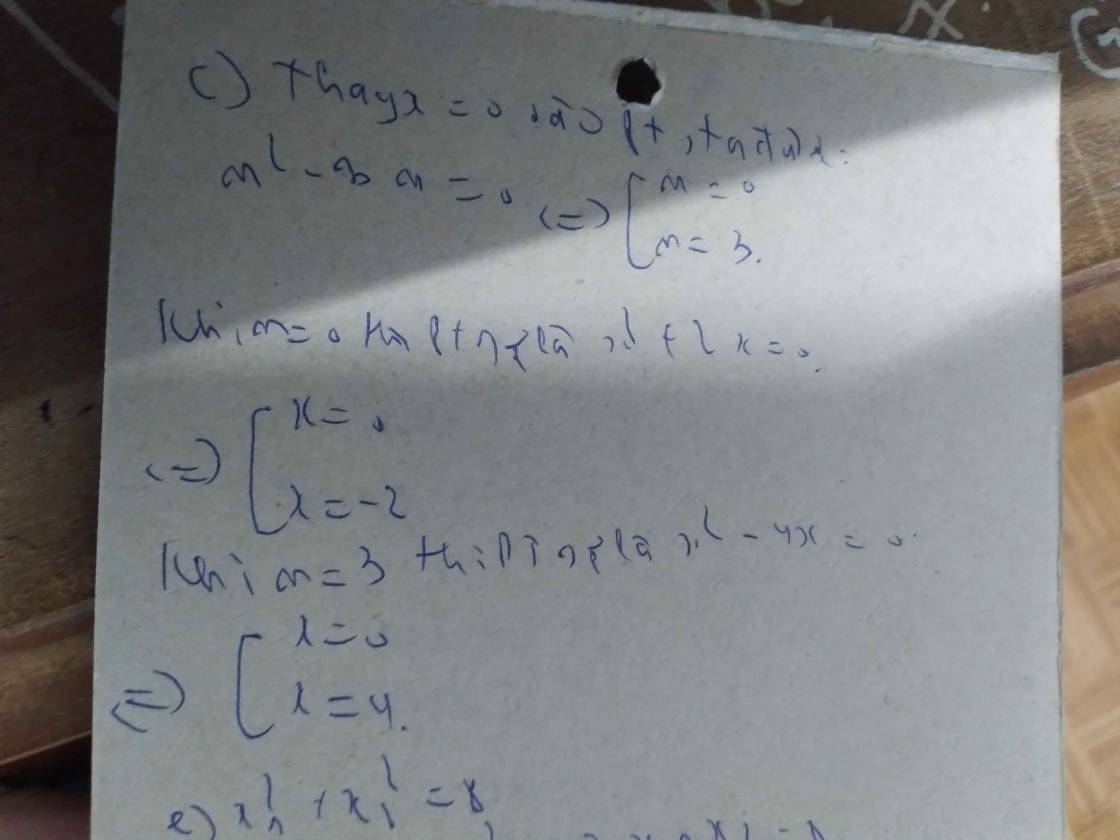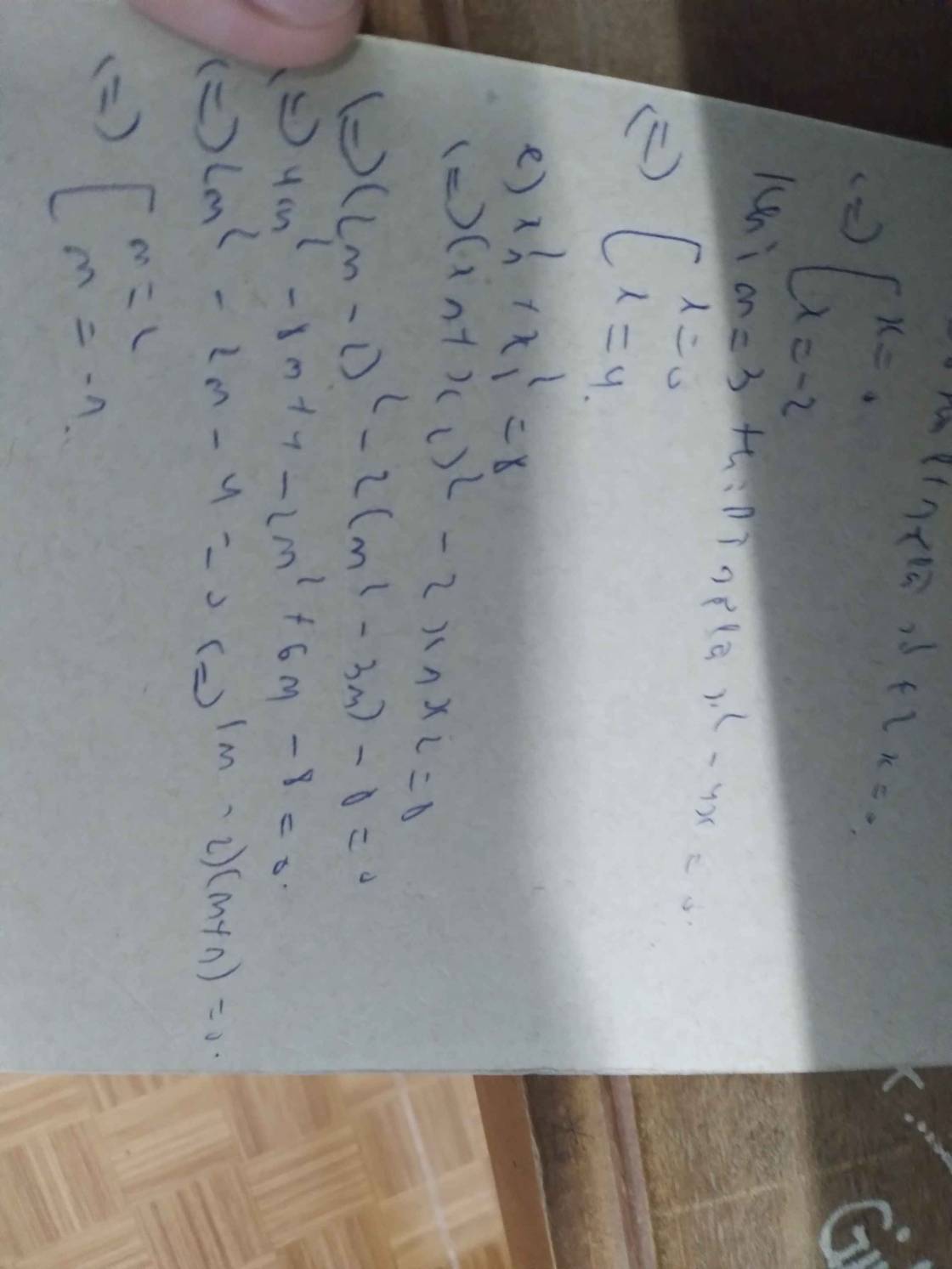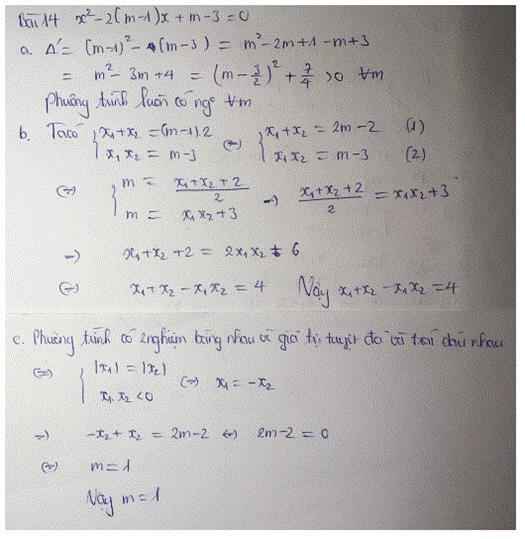Hãy nhập câu hỏi của bạn vào đây, nếu là tài khoản VIP, bạn sẽ được ưu tiên trả lời.

a: \(\Delta=\left[-2\left(m-1\right)\right]^2-4\cdot1\cdot\left(-m\right)\)
\(=\left(2m-2\right)^2+4m\)
\(=4m^2-8m+4+4m=4m^2-4m+4\)
\(=4m^2-4m+1+3=\left(2m-1\right)^2+3>0\forall m\)
=>Phương trình luôn có hai nghiệm phân biệt
Theo Vi-et, ta có:
\(\left\{{}\begin{matrix}x_1+x_2=\dfrac{-b}{a}=\dfrac{-\left[-2\left(m-1\right)\right]}{1}=2\left(m-1\right)=2m-2\\x_1x_2=\dfrac{c}{a}=-\dfrac{m}{1}=-m\end{matrix}\right.\)
\(x_1+x_2+2x_1x_2=2m-2+\left(-2m\right)=-2\)
=>\(x_1+x_2+2\cdot x_1\cdot x_2\) là hệ thức không phụ thuộc vào m
b: Để phương trình có đúng 1 nghiệm âm thì nghiệm còn lại sẽ lớn hơn hoặc bằng 0
=>a*c<=0
=>1*(-m)<=0
=>-m<=0
=>m>=0
c: Để \(\left\{{}\begin{matrix}\left|x_1\right|=\left|x_2\right|\\x_1\cdot x_2< 0\end{matrix}\right.\) thì \(x_1=-x_2\)
=>\(x_1+x_2=0\)
=>2(m-1)=0
=>m-1=0
=>m=1
d: \(\left|x_1-x_2\right|=\sqrt{\left(x_1-x_2\right)^2}\)
\(=\sqrt{\left(x_1+x_2\right)^2-4x_1x_2}\)
\(=\sqrt{\left(2m-2\right)^2-4\cdot1\left(-m\right)}\)
\(=\sqrt{4m^2-8m+4+4m}\)
\(=\sqrt{4m^2-4m+4}\)
\(=\sqrt{\left(2m-1\right)^2+3}>=\sqrt{3}\forall m\)
Dấu '=' xảy ra khi 2m-1=0
=>\(m=\dfrac{1}{2}\)

b, Để phương trình có 2 nghiệm \(\Delta\ge0\)
hay \(\left(2m+8\right)^2-4.m^2=4m^2+32m+64-4m^2=32m+64\ge0\)
\(\Leftrightarrow32m\ge64\Leftrightarrow m\ge2\)
Theo Vi et ta có : \(\left\{{}\begin{matrix}x_1+x_2=-\dfrac{b}{a}=2m+8\\x_1x_2=\dfrac{c}{a}=m^2\end{matrix}\right.\)
mà \(\left(x_1+x_2\right)^2=4m^2+32m+64\Rightarrow x_1^2+x_2^2=4m^2+32m+64-2x_1x_2\)
\(=4m^2+32m+64-2m^2=2m^2+32m+64\)
Lại có : \(x_1^2+x_2^2=-2\)hay \(2m^2+32m+66=0\Leftrightarrow m=-8+\sqrt{31}\left(ktm\right);m=-8-\sqrt{31}\left(ktm\right)\)
a) Thay m=8 vào phương trình, ta được:
\(x^2-2\cdot\left(8+4\right)x+8^2=0\)
\(\Leftrightarrow x^2-24x+64=0\)
\(\text{Δ}=\left(-24\right)^2-4\cdot1\cdot64=576-256=320\)
Vì Δ>0 nên phương trình có hai nghiệm phân biệt là:
\(\left\{{}\begin{matrix}x_1=\dfrac{24+8\sqrt{5}}{2}=12+4\sqrt{5}\\x_2=\dfrac{24-8\sqrt{5}}{2}=12-4\sqrt{5}\end{matrix}\right.\)
Vậy: Khi m=8 thì phương trình có hai nghiệm phân biệt là \(x_1=12+4\sqrt{5};x_2=12-4\sqrt{5}\)

a: Thay x=5 vào pt, ta được:
5^2-2(m-1)*5+m^2-4m+3=0
=>m^2-4m+3+25-10m+10=0
=>m^2-14m+38=0
=>(m-7)^2=11
=>\(m=\pm\sqrt{11}+7\)
b: x1+x2=2m-2
x1*x2=m^2-4m+3
(x1+x2)^2-4x1x2
=4m^2-8m+4-4m^2+4m-6
=-4m-2
(x1+x2)^2-4x1x2+2(x1+x2)
=-4m-2+4m-4=-6

Bài 1:
a, Thay m=-1 vào (1) ta có:
\(x^2-2\left(-1+1\right)x+\left(-1\right)^2+7=0\\
\Leftrightarrow x^2+1+7=0\\
\Leftrightarrow x^2+8=0\left(vô.lí\right)\)
Thay m=3 vào (1) ta có:
\(x^2-2\left(3+1\right)x+3^2+7=0\\ \Leftrightarrow x^2-2.4x+9+7=0\\ \Leftrightarrow x^2-8x+16=0\\ \Leftrightarrow\left(x-4\right)^2=0\\ \Leftrightarrow x-4=0\\ \Leftrightarrow x=4\)
b, Thay x=4 vào (1) ta có:
\(4^2-2\left(m+1\right).4+m^2+7=0\\ \Leftrightarrow16-8\left(m+1\right)+m^2+7=0\\ \Leftrightarrow m^2+23-8m-8=0\\ \Leftrightarrow m^2-8m+15=0\\ \Leftrightarrow\left(m^2-3m\right)-\left(5m-15\right)=0\\ \Leftrightarrow m\left(m-3\right)-5\left(m-3\right)=0\\ \Leftrightarrow\left(m-3\right)\left(m-5\right)=0\\ \Leftrightarrow\left[{}\begin{matrix}m=3\\m=5\end{matrix}\right.\)
c, \(\Delta'=\left[-\left(m+1\right)\right]^2-\left(m^2+7\right)=m^2+2m+1-m^2-7=2m-6\)
Để pt có 2 nghiệm thì \(\Delta'\ge0\Leftrightarrow2m-6\ge0\Leftrightarrow m\ge3\)
Theo Vi-ét:\(\left\{{}\begin{matrix}x_1+x_2=2m+2\\x_1x_2=m^2+7\end{matrix}\right.\)
\(x_1^2+x_2^2=0\\ \Leftrightarrow\left(x_1+x_2\right)^2-2x_1x_2=0\\ \Leftrightarrow\left(2m+2\right)^2-2\left(m^2+7\right)=0\\ \Leftrightarrow4m^2+8m+4-2m^2-14=0\\ \Leftrightarrow2m^2+8m-10=0\\ \Leftrightarrow\left[{}\begin{matrix}m=1\left(ktm\right)\\m=-5\left(ktm\right)\end{matrix}\right.\)
\(x_1-x_2=0\\ \Leftrightarrow\left(x_1-x_2\right)^2=0\\ \Leftrightarrow\left(x_1+x_2\right)^2-4x_1x_2=0\\ \Leftrightarrow\left(2m+2\right)^2-4\left(m^2+7\right)=0\\ \Leftrightarrow4m^2+8m+4-4m^2-28=0\\ \Leftrightarrow8m=28=0\\ \Leftrightarrow m=\dfrac{7}{2}\left(tm\right)\)
Bài 2:
a,Thay m=-2 vào (1) ta có:
\(x^2-2x-\left(-2\right)^2-4=0\\ \Leftrightarrow x^2-2x-4-4=0\\ \Leftrightarrow x^2-2x-8=0\\ \Leftrightarrow\left[{}\begin{matrix}x=4\\x=-2\end{matrix}\right.\)
b, \(\Delta'=\left(-m\right)^2-\left(-m^2-4\right)\ge0=m^2+m^2+4=2m^2+4>0\)
Suy ra pt luôn có 2 nghiệm phân biệt
Theo Vi-ét:\(\left\{{}\begin{matrix}x_1+x_2=2\\x_1x_2=-m^2-4\end{matrix}\right.\)
\(x_1^2+x_2^2=20\\ \Leftrightarrow\left(x_1+x_2\right)^2-2x_1x_2=20\\ \Leftrightarrow2^2-2\left(-m^2-4\right)=20\\ \Leftrightarrow4+2m^2+8-20=0\\ \Leftrightarrow2m^2-8=0\\ \Leftrightarrow m=\pm2\)
\(x_1^3+x_2^3=56\\ \Leftrightarrow\left(x_1+x_2\right)^3-3x_1x_2\left(x_1+x_2\right)=56\\ \Leftrightarrow2^3-3\left(-m^2-4\right).2=56\\ \Leftrightarrow8-6\left(-m^2-4\right)-56\\ =0\\ \Leftrightarrow8+6m^2+24-56=0\\ \Leftrightarrow6m^2-24=0\\ \Leftrightarrow m=\pm2\)
\(x_1-x_2=10\\ \Leftrightarrow\left(x_1-x_2\right)^2=100\\ \Leftrightarrow\left(x_1+x_2\right)^2-4x_1x_2-100=0\\ \Leftrightarrow2^2-4\left(-m^2-4\right)-100=0\\ \Leftrightarrow4+4m^2+16-100=0\\ \Leftrightarrow4m^2-80=0\\ \Leftrightarrow m=\pm2\sqrt{5}\)

a) Thay \(m=-5\) vào PT ta được:
\(x^2-\left(-5\right)x+2.\left(-5\right)-3=0\)
\(\Rightarrow x^2+5x-10-3=0\)
\(\Rightarrow x^2+5x-13=0\)
\(\Delta=5^2-4.1.\left(-13\right)=25+52=77>0\)
PT có 2 nghiệm phân biệt:
\(x_1=-\frac{5+\sqrt{77}}{2}\)
\(x_2=-\frac{5-\sqrt{77}}{2}\)
Vậy với m = -5 thì PT có nghiệm là \(S=\left\{-\frac{5+\sqrt{77}}{2};-\frac{5-\sqrt{77}}{2}\right\}\)
b) PT có nghiệm kép \(\Leftrightarrow\Delta=0\Leftrightarrow\left(-m\right)^2-4.1.\left(2m-3\right)=0\)
\(\Leftrightarrow m^2-8m+12=0\Leftrightarrow\left(m-2\right)\left(m-6\right)=0\)
\(\Leftrightarrow\int^{m-2=0}_{m-6=0}\Leftrightarrow\int^{m=2}_{m=6}\)
Vậy với m = 2 và m = 6 thì PT có nghiệm kép.
c) PT có 2 nghiệm trái dấu \(\Leftrightarrow\int^{\Delta>0}_{2m-36}_{m0\Leftrightarrow m>6\)

b: Để phương trình có hai nghiệm trái dấu thì (m+2)(m-4)<0
=>-2<m<4

1.Ta có \(\Delta=4m^2-4\left(m^2-m-3\right)=4m+12\)
Để phương trình có 2 nghiệm phân biệt \(\Rightarrow\Delta>0\Rightarrow4m+12>0\Rightarrow m>-3\)
Theo hệ thức Viet ta có \(\hept{\begin{cases}x_1+x_2=2m\\x_1.x_2=m^2-m-3\end{cases}}\)
a. Phương trình có 2 nghiệm trái dấu \(\Rightarrow x_1.x_2< 0\Rightarrow m^2-m-3< 0\Rightarrow\frac{1-\sqrt{13}}{2}< m< \frac{1+\sqrt{13}}{2}\)
Vậy \(\frac{1-\sqrt{13}}{2}< m< \frac{1+\sqrt{13}}{2}\)
b. Phương trình có 2 nghiệm phân biệt dương \(\Leftrightarrow\hept{\begin{cases}x_1+x_2=2m>0\\x_1.x_2=m^2-m-3>0\end{cases}\Leftrightarrow\hept{\begin{cases}m>0\\m< \frac{1-\sqrt{13}}{2}\end{cases}\left(l\right);\hept{\begin{cases}m>0\\m>\frac{1+\sqrt{13}}{2}\end{cases}\Leftrightarrow m>\frac{1+\sqrt{13}}{2}}}}\)
Vậy \(m>\frac{1+\sqrt{13}}{2}\)
2. a.Ta có \(\Delta=\left(2m-1\right)^2+4m=4m^2-4m+1+4m=4m^2+1\)
Ta thấy \(\Delta=4m^2+1>0\forall m\)
Vậy phương trình luôn có 2 nghiejm phân biệt với mọi m
b. Theo hệ thức Viet ta có \(\hept{\begin{cases}x_1+x_2=1-2m\\x_1.x_2=-m\end{cases}}\)
Để \(x_1-x_2=1\Leftrightarrow\left(x_1-x_2\right)^2=1\Leftrightarrow\left(x_1+x2\right)^2-4x_1x_2=1\)
\(\Leftrightarrow\left(1-2m\right)^2-4.\left(-m\right)=1\Leftrightarrow4m^2-4m+1+4m=1\)
\(\Leftrightarrow m^2=0\Leftrightarrow m=0\)
Vậy \(m=0\)thoă mãn yêu cầu bài toán



